We’re all looking for things to cheer us up in these apocalyptic times when even a trip to the supermarket is fraught with potential danger. We live online to an even greater extent now than ever before, and it is in the online realm that many are sharing their heart-warming stories of individuals doing good deeds while others are busy hoarding toilet paper.
The online left has gotten involved too and has been using social media to lionise one of its stock heroic figures: the Cuban doctor. Several posts have gone viral this week featuring small brigades of medics flying out from Havana airport to aid Europe’s coronavirus relief effort.
The Cuban dictatorship has invested heavily in medical diplomacy since the 1960s. Leasing doctors to other countries is one of its main sources of hard currency. As an example, under agreements set up by the late Venezuelan president Hugo Chavez, Cuba receives 100,000 barrels of Venezuelan oil per day in exchange for thousands of doctors and dentists.
Of course, little attention is paid to the conditions they are forced to toil under, which resemble nothing less than indentured labour. Cuban doctors on overseas missions only receive between 10% and 25% of the salary paid by host countries, with the rest confiscated by the Cuban government. Moreover, their passports are confiscated and they are closely watched over by the Castro regime’s political commissars. They are posted to some of the most dangerous spots in the world and have little say over where they are sent.
Indeed, as a recent academic paper looking at the dark side of Cuban medical diplomacy phrased it, “This exportation of physicians, which Cuban authorities insist on calling ‘proletarian internationalism’ or ‘solidary support’, is being implemented in a context of strict control that violates the labour rights of Cuban physicians and the International Labour Organization agreements on the protection of wages.”
Considering the Cuban regime’s domestic contempt for independent trade unionism, perhaps its treatment of overseas workers shouldn’t surprise anyone. Western admirers of the Cuban dictatorship would never tolerate any of this themselves. But such privations are apparently acceptable for the Cuban people. “A map of the world that does not include Utopia is not worth even glancing at,” as Oscar Wilde famously put it. He might have added: “as long as you live in a different part of the map”.
I’ve been making this argument for many years now. But raise a sceptical voice about Cuban medical diplomacy on the left and your conversations will invariably soon be full of the sorts of people the Hungarian-British author Arthur Koestler once compared to peeping toms, “peering through a hole in the wall at ‘history’ while not having to experience it themselves”. Useful idiots live out their ideological fantasies through the people of Cuba while having to suffer none of the privations that go along with communism. They get a dash of the glamour surrounding Fidel and Che and the Cuban revolution while the Cubans themselves – out of sight and out of mind – endure decades of rationing, censorship and state-sponsored brutality.
Politics in the West is a fairly torpid and technocratic affair. The romantic penumbra surrounding the Cuban Revolution lets idealists in liberal democracies play out their violent ideological fantasies through tough-guy authoritarians. Something similar is true of dictatorships such as that in Iran or Libya. The first time I heard outgoing Labour leader Jeremy Corbyn speak in public in 2011, he was lionising the “achievements” of the brutal Colonel Gaddafi regime. Corbyn was also a guest on Iran’s Press TV and a regular attendee at Hezbollah’s Al-Quds march in London. Pointing out the brutality of some of the forces behind such groupings is besides the point: the air of violence is part of the attraction for men like Corbyn and too many others on the left.
In his memoir Before Night Falls, the gay Cuban dissident writer Reinaldo Arenas aptly summed up the difference between the capitalist system and the communism one. “Although both kick you in the ass,” Arenas wrote, “in the communist system you have to applaud, while in the capitalist system you can scream.”
Unfortunately, a lot of the screaming we hear nowadays in the West involves a misplaced yearning for authoritarianism under the banner of socialism. People want desperately to believe in something – or as Christopher Hitchens once quipped about George Galloway – their “search for a tyrannical fatherland never ends”.
There are plenty of things that should inspire us as we try to get through the coronavirus pandemic. Cuba’s rotten dictatorship, and its exploitation of medical personal for propaganda purposes, shouldn’t be one of them.
Click here to subscribe to our daily briefing – the best pieces from CapX and across the web.
CapX depends on the generosity of its readers. If you value what we do, please consider making a donation.


